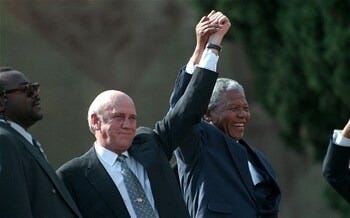States of America
between chaos and common ground
I was a few months short of my thirteenth birthday in the autumn of 1994 when my father handed me a key to the gun safe. “If I’m not here, get everyone to the bottom floor, lock the security gate, and stay there until help arrives.” In the lead-up to South Africa's first democratic election, there was widespread fear of violence and civil war. I don’t know what help my father was referring to—I don’t think he knew either.
As a foreigner peering in on the U.S. elections today, I’m reminded that sometimes, stakes can feel impossibly high, and acts of leadership can define the line between peace and chaos, even life and death. Nelson Mandela and FW de Klerk won the Nobel Peace Prize for their roles in South Africa’s transition to democracy, an event still seen as one of the most remarkable achievements in modern history.
Just how high are the stakes in this election? If they truly are critical, is there anything more essential in a leader than the ability to unite people in service of something greater than themselves—to help us see the shared values that transcend our differences? I don’t know that there is.
From this vantage point, the US election is both spectacle and specimen. Right now in America, a primal energy is stirring among those who feel they can’t afford the luxury of restraint. It brings to mind a curious saying:
“Never start a fight with someone too weak to fight back—they might just kill you.”
There’s a wisdom in this about human nature: when we believe our opponents represent the end of everything we value, compromise naturally gives way to crusade. And yet, clinging desperately to a vision of the world we fear losing can bind us to it, enslaving us in ways we may not see. In resisting one another so fiercely, we risk becoming the very thing we fear—a single, unyielding force, driven by fear and willing to abandon everything but its own survival.
In times like these, it’s essential to remember that principle can be elevated to outweigh political gain. It’s troubling when those who once decried media bias now applaud a billionaire tipping the scales in their favour. Integrity requires a consistent application of principles, not selective outrage based on which side benefits. If we condemn bias only when it works against us and celebrate when it serves us, we betray the ideals of fairness and democracy we claim to uphold.
For those of us on the outside, America is a paradox—a vibrant, often wild spectacle of contradiction and inspiration. What’s perhaps most fascinating, and even endearing, is its acceptance of its own absurdity. But absurdity can’t be the defining feature. A return to calmer waters is essential—a place where we can fiercely disagree without losing sight of our shared humanity, where we can still recognise virtue in our opponents. Values transcend party lines, but only if leaders insist on it.
We don’t have to look far to find examples of such commitment. Consider John McCain’s decency in the 2008 election, or the gracious tribute President Barack Obama offered at his funeral.
As Obama said of McCain, "Perhaps that’s how we honour him best—by recognising that some things are bigger than party, ambition, money, fame, or power. There are principles worth risking everything for, eternal values, and abiding truths. At his best, John showed us what that means. For that, we are all deeply in his debt."
In this election, who inspires such a sense of indebtedness?




thanks for that / we need this kind of writing and this kind of dialogue / this is my hope for substack and facebook (where i posted the link) and at the cafe and in our daily lives
Well said. Agreed.